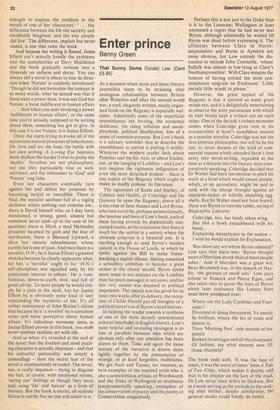Enter prince
Benny Green
That Sunny Dome Donald Low (Dent e5.95)
At a moment when more and more literary journalists seem to be straining after analogous relationships between Britain after Waterloo and after the second world war, a cool, elegantly written, neatly organised book on the Regency is especially welcome. Admittedly some a the superficial resemblances are inviting, the economic doldrums, the rising inflation and unemployment, political disaffection, loss of a sense of common purpose. But Low's book is a salutary reminder that to describe the resemblance as partial is putting it mildly. Whatever the modern reader feels about Peterloo and the Six Acts, or about Enclosure, or the hanging of Luddites — and Low's text inspires the righteous indignation of even the most detached student — there is one aspect of the Regency which ought to make us madly jealous; its literature.
The signatures of Keats and Shelley, of Cobbett and Hazlitt, of Coleridge and De Quincey lie upon the Regency; above all it is the time of Jane Austen and Lord Byron, who turn out to be, perhaps unintentionally, the heroine and hero of Low's book, each of them having arrived, by dramatically contrasted routes, at the conclusion that there is much for the satirist in a society where the ultimate criterion is a financial one. It is startling enough to read Byron's maiden speech in the House of Lords, in which he spoke against the Bill to 'make framebreaking a capital offence. Having conceived a schoolboy ambition to become a great orator in the classic mould, Byron spoke more sense in ten minutes on the Luddites than his peers managed in ten years, and for this very reason was doomed to political impotence. The speech was too good for its time; two weeks after its deliwery, the reception of Childe Harold put all thoughts of a political career out of Byron's head forever.
In helping the reader towards a synthesis of one of the most densely concentrated cultural interludes in English history, Low's most helpful and revealing stratagem is to hint at parallels between men which are obvious only after our attention has been drawn to them. Time and again the loose texture of the narrative is drawn more tightly together by the presentation of strange, or at least forgotten, bedfellows. We get Nash and Turner, for instance, as twin examples of the inspired artist who is also a conscientious artisan, or Wordsworth and the Duke of Wellington as soulmates temperamentally speaking, exemplars of the conservatism of poetry and the poetry of Conservatism respectively. Perhaps this is less just to the Duke than it is to the Laureate; Wellington at least expressed a regret that he had never met Byron, although admittedly he waited till Byron was dead before expressing it. The affinities between Clare in Northamptonshire and Burns in Ayrshire are more obvious, but Low extends the discussion to include John Constable, 'whose Suffolk was almost as low-lying as Clare's Northamptonshire'. With Clare remains the honour of having coined the most contemptuous epigram on Enclosure: 'Little parcels little minds to please.'
However, the great appeal of the Regency is that it sported so many great minds too, and it is delightfully entertaining to observe the witty persistence with which its best brains kept a critical eye on each other. One of the decade's richest moments comes when Coleridge gives vent to his exasperation at Scott's scandalous success as a popular novelist. Coleridge was not the first abstruse philosopher, nor will he be the last, to covet dreams of the kind of commercial success which attended Scott's first entry into novel-writing, regarded at the time as a descent into the literary mire comparatively speaking. Coleridge decided that Sir Walter had been too anxious to pitch his work at a level which would amuse people, which, as an accusation, might be said t6 rank with the charge brought against an omelette-maker of wilfully smashing eggshells. But Sir Walter need not have feared; there was Byron to turn the tables, saying of Biographia Literaria:
Coleridge, too, has lately taken wing, But like a hawk encumbered with his hood, Explaining metaphysics to the nation — I wish he would explain his Explanation.
Was there any wit whom Byron admired? Low says that there was: 'Byron thought more of Sheridan drunk than of most people sober.' And if Sheridan was a great wit, Beau Brummell was, in the remark of Hazlitt, `the greatest of small wits'. Low pays tribute to Peacock and Pierce Egan, and also takes care to quote the lines of Byron which later craftsmen like Lorenz Hart must have pondered over:
The book ends with, 'It was the best of times, it was the worst of times' from A Tale of Two Cities, which makes it doubly odd that in his chapter on the lure of the road, Dr Low never once refers to Dickens. But as a work serving as the prelude to the seeking after further, deeper scholarship, the general reader could hardly do better.


































 Previous page
Previous page